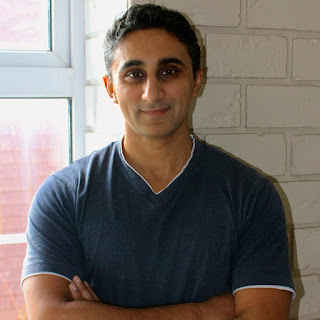Name:- Abir Mukherjee
Job:- author (and former accountant)
Twitter:- @radiomukhers
Website :- https://abirmukherjee.com
Introduction:-
Abir Mukherjee is a Hamilton raised former accountant turned crime writer of the Times bestselling author of the Wyndham & Banerjee series of crime novels set in Raj-era India. His books have won numerous awards including the CWA Dagger for best Historical Novel, the Prix du Polar Européen (A Rising Man), the Wilbur Smith Award for Adventure Writing (A Necessary Evil) and the Amazon Publishing Readers Award for E-book for the Year.
His first book A Rising Man (2016) was shortlisted for the Theakston's Crime Novel of the Year Award in 2018. It was also both the Waterstones' Thriller of the Month and the Sunday Times Crime Book of the Month in May 2017. It also won the CWA Endevour Historical Dagger, a Barry Award and the Jhalak Prize. It also won the Harvill Secker and Daily Telegraph crime writing competition. His second book A Necessary Evil was published in 2017 and was also nominated for Gold Dagger and a Barry Award,
His third book Smoke and Ashes (2018), the fourth book was also shorlisted for the CWA Sapere Historical Dagger and the HWA (Historical Writers Association) Gold Crown and longlisted for the CWA Gold Dagger. Death in The East (2019 )was also won the CWA Sapere Historical Dagger and was also a Sunday Times books of 2021 pick. Shadows of Men (2021) shortlisted for the Gold Dagger. Alongside fellow author, Vaseem Khan, he also hosts the popular Red Hot Chilli Writers podcast,
Current book? (This can either be the current book that you are reading or writing)
I’m currently reading The Black Drop by Leonora Nattrass, set in the London of the 1790s on the brink of revolution and possible war with America.
Favourite book?
Only ever one choice: Nineteen Eighty Four by George Orwell
Which two characters would you invite to dinner and why?
Bernie Gunther and Arkady Renko – two anti-heroes from different countries, both beaten down, but both linked by that thread of common decency. I think both of them would appreciate a good meal and neither would judge my cooking abilities too harshly.
How do you relax?
My feet up, some good music and a glass of whisky.
Which book do you wish you had written and why?
Razorblade Tears by S A Cosby – It’s a fantastic concept and a brilliant book. It’s the sort of thing I wish I could write.
What would you say to your younger self if you were just starting out as a writer.
Have more self-confidence. Start earlier. Don’t spend twenty years of your life being an accountant!
How would you describe your series characters?
Sam Wyndham is a tired, jaded ex Scotland Yard detective who takes a job in Calcutta as it’s slightly preferable to suicide. Surendranath Banerjee (known as Surrender-not by his linguistically challenged British superiors) is a clever, idealistic, young detective who puts Sam on a pedestal – at least until he works with him. They develop an odd, but close friendship, solving crimes while negotiating the racial tensions of the closing decades of the Raj.
With Town and Country: Green Lanes to Mean Streets being the theme at St Hilda's this year, Where is your favourite town and where is your favourite country? Why have you chosen these?
My favourite town has to be Kolkata (Calcutta) – it’s not an easy place to live, but once you see beyond the surface, you discover a place of art and culture and humour and love and vibrancyto rival anywhere in the world.
As for my favourite country – right now I’m still basking in the glow of returning from a trip to Polignano in the south of Italy and so, I’d have to say Italy – for the food, the wine, the climate and the good friends I’ve made there.
What are you looking forward to at St Hilda's?
The stimulating debate, the wonderful lectures and the sheer fun of hanging out with people who love crime fiction.
The Shadows of Men by Abir Mukherjee (Vintage Publishing) Out Now
Calcutta, 1923. When a Hindu theologian is found murdered in his home, the city is on the brink of all-out religious war. Can officers of the Imperial Police Force, Captain Sam Wyndham and Sergeant Surendranath Banerjee track down those responsible in time to stop a bloodbath? Set at a time of heightened political tension, beginning in atmospheric Calcutta and taking the detectives all the way to bustling Bombay, the latest instalment in this 'unmissable series presents Wyndham and Banerjee with an unprecedented challenge. Will this be the case that finally drives them apart?
Information about 2022 St Hilda's College Crime Fiction Weekend and how to book tickets can be found here.




















